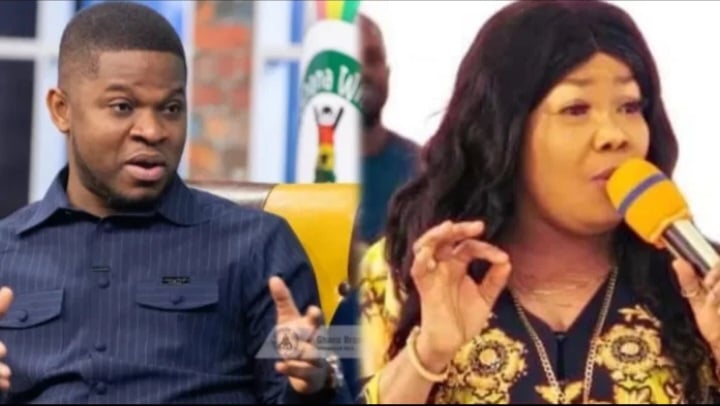Evangelist Mama Pat, widely recognized by her moniker Agradaa, a figure often embroiled in controversy within Ghana’s religious broadcasting landscape, has recently voiced her newfound admiration for Sammy Gyamfi, the National Communications Officer of the National Democratic Congress (NDC). This unexpected endorsement follows a chance encounter between the two, which appears to have significantly shifted Agradaa’s political leanings. Previously a vocal critic of the NDC and its flagbearer, John Dramani Mahama, particularly during the lead-up to the 2024 elections, Agradaa now projects an eight-year presidency for Mahama, a stark contrast to her earlier stance. The meeting with Gyamfi served as the catalyst for this transformation, prompting a public apology from Agradaa for her past criticisms.
The narrative of their meeting, as recounted by Agradaa herself in a widely circulated video, emphasizes Gyamfi’s graciousness and generosity. Despite her previous attacks on the party and its leader, Agradaa describes being met with acceptance and warmth, rather than the anticipated rejection. She approached Gyamfi to offer an apology for her past conduct, and instead of being rebuked or dismissed, she was welcomed and embraced. This unexpected reception appears to have deeply impacted Agradaa, leading her to publicly recant her previous criticisms and express her support for Mahama’s presidential bid. The encounter, she suggests, highlights a level of magnanimity and forgiveness within the NDC that she had not previously recognized.
Adding another layer to this narrative is Agradaa’s account of requesting financial assistance from Gyamfi. Following their conversation, she asked him for money for fuel, a request he readily fulfilled, providing her with $800. This act of generosity, according to Agradaa, solidified her positive impression of Gyamfi, prompting her to playfully declare her allegiance to him. She portrays his willingness to help as a demonstration of his character and further evidence of the NDC’s welcoming attitude. This public declaration of support, coupled with the financial transaction, has inevitably sparked speculation and discussion about the nature of their interaction and its potential political implications.
Agradaa’s shift in political alignment, however sudden and seemingly transactional, underscores the fluidity of political loyalties, particularly within the dynamic landscape of Ghanaian politics. Her previous criticisms of the NDC and Mahama, now replaced by expressions of support and predictions of an extended presidency, highlight the potential for rapid changes in political allegiances, often influenced by personal interactions and perceived generosity. While her public apology and subsequent endorsement of Mahama might be viewed with skepticism by some, it nonetheless represents a significant shift in her public persona and political stance.
Furthermore, Agradaa’s justification for her change of heart – “Today it’s my turn, tomorrow will be your turn, so don’t be angry or envious” – reveals a pragmatic, perhaps even opportunistic, approach to political affiliations. This statement suggests a transactional view of political support, where allegiance can be swayed by acts of kindness or financial assistance. While such a perspective might be criticized, it also reflects a reality within political systems where personal relationships and material benefits can play a significant role in shaping political loyalties. Agradaa’s candidness in acknowledging this dynamic, while potentially controversial, sheds light on the complexities of political maneuvering and the various factors that can influence individual allegiances.
In conclusion, Agradaa’s public endorsement of Sammy Gyamfi and the NDC, fueled by a chance encounter and a subsequent act of generosity, offers a glimpse into the often unpredictable nature of political alignments. Her narrative, while open to interpretation, highlights the role of personal interactions, perceptions of generosity, and pragmatic considerations in shaping political loyalties. Whether this newfound allegiance represents a genuine change of heart or a strategic move remains to be seen, but it undoubtedly adds another layer of complexity to the ongoing political discourse in Ghana. Her story, regardless of its underlying motivations, serves as a reminder of the fluidity of political alliances and the diverse factors that can influence individual political choices.


